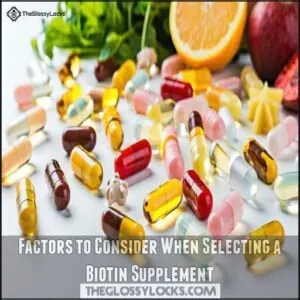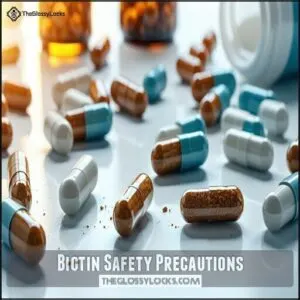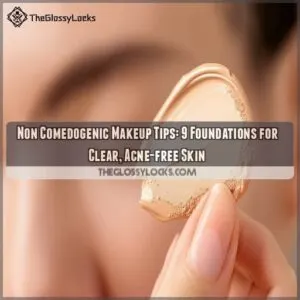This site is supported by our readers. We may earn a commission, at no cost to you, if you purchase through links.
 When choosing the best biotin supplement, you’ll want to look for options with 2,500-10,000 mcg per serving and third-party testing.
When choosing the best biotin supplement, you’ll want to look for options with 2,500-10,000 mcg per serving and third-party testing.
Pure Encapsulations and Klaire Labs offer high-quality, research-backed formulations without unnecessary fillers.
You’ll get more bang for your buck with supplements that combine biotin with complementary nutrients like collagen, zinc, and vitamins C and E.
Remember that consistency is key—your hair won’t transform overnight, but many users report noticeable improvements within 3-4 months.
The right biotin supplement can support not just your appearance but also energy metabolism and nervous system function beneath the surface.
Table Of Contents
- Key Takeaways
- Biotin Benefits Explained
- Choosing Biotin Wisely
- Top 9 Biotin Supplements
- 1. Vegan Collagen Builder for Hair Skin Nails
- 2. Olly Ultra Strength Hair Softgels
- 3. Hair Skin Nails Ultra Supplement
- 4. Pure Encapsulations Biotin 8mg Supplement
- 5. Biotin Gummies for Hair Skin and Nails
- 6. Hair Skin Nails Growth Supplement
- 7. Extra Strength Biotin Liquid Supplement
- 8. Klaire Labs Biotin 5000 mcg
- 9. Nature Made Biotin for Healthy Hair
- Maximizing Biotin Effects
- Biotin Safety Precautions
- Frequently Asked Questions (FAQs)
- What are the benefits of taking biotin supplements?
- How to use biotin supplements for clear skin?
- How much biotin should I take daily?
- Are biotin supplements safe to take?
- Which brand is best for biotin?
- Do biotin supplements really work?
- What strength of biotin should I take?
- What is the best brand of biotin to take?
- Which type of biotin is best?
- Is it better to take 5000 or 10,000 biotin?
- Conclusion
Key Takeaways
- Look for biotin supplements with 2,500-10,000 mcg per serving and third-party testing from reputable brands like Pure Encapsulations and Klaire Labs that minimize unnecessary fillers.
- You’ll see better results by choosing supplements that combine biotin with complementary nutrients like collagen, zinc, vitamin C, and vitamin E for enhanced absorption and effectiveness.
- Consistency is crucial—don’t expect overnight transformations, but commit to your biotin regimen for at least 3-4 months to notice significant improvements in your hair, skin, and nail health.
- Remember to stop taking biotin supplements at least 48 hours before any bloodwork, as they can interfere with important test results like thyroid and heart function tests.
Biotin Benefits Explained
Your body relies on biotin to convert food into energy and maintain healthy hair, skin, and nails.
This essential B vitamin also supports cell communication and gene regulation, making it a vital nutrient for overall health maintenance.
Biotin’s Role in Energy Production
Throughout your day, biotin works behind the scenes as a key player in your body’s energy production.
This B vitamin functions as a coenzyme in metabolism, helping break down carbohydrates, fats, and proteins into usable energy.
Biotin is essential for glucose metabolism, fatty acid breakdown, and protein synthesis.
It also supports gluconeogenesis—creating glucose from non-carbohydrate sources—which keeps your cellular energy flowing, especially during fasting periods.
Importance of Biotin for Hair, Skin, and Nails
Biotin plays a pivotal role in maintaining your hair, skin, and nail health. It’s often called the "beauty vitamin" for good reason.
When your body has adequate biotin levels, you’ll likely notice significant improvements in these areas.
- Hair Growth: Biotin strengthens hair follicles, potentially reducing breakage and thinning
- Nail Strength: Helps prevent brittle, splitting nails by promoting keratin production
- Skin Radiance: Supports healthy cell turnover for clearer, more vibrant skin
- Deficiency Signs: Thinning hair and brittle nails often signal low biotin levels
- Supplement Efficacy: Most people see visible improvements within 3-6 months of consistent use
Other Health Benefits of Biotin
Beyond improving your appearance, biotin works behind the scenes in your body.
It supports nerve function and cognitive health while helping regulate blood sugar levels—particularly beneficial for those with diabetes.
During pregnancy, biotin plays a vital role in fetal development.
Your metabolism gets a boost too, as biotin converts food into energy, fighting fatigue.
Some research even suggests biotin may enhance immune support, though more studies are needed.
A deficiency can lead to thinning or hair loss.
Choosing Biotin Wisely
You’ll need to navigate through countless biotin options to find supplements that deliver real results without unnecessary fillers or false claims.
Third-party testing, appropriate dosage levels, and quality ingredients should guide your selection process when choosing a supplement that’s right for your specific health needs.
Factors to Consider When Selecting a Biotin Supplement
Now that you know biotin’s benefits, let’s talk about what to look for in a good supplement.
You’ll want to evaluate supplement form (capsules or gummies), dosage levels (typically 30-10,000 mcg), and ingredient quality.
Many people consider the best supplement options when making a decision.
Check for unnecessary fillers or allergens that don’t align with your dietary needs. Remember, higher biotin dosage doesn’t always mean better results, and some people experience mild side effects like digestive upset.
Importance of Third-Party Certifications
Trust serves as your safety net when choosing biotin supplements.
Third-party certifications from NSF International or United States Pharmacopeia (USP) verify purity and potency, ensuring what’s on the label matches what’s in the bottle.
Look for CGMP compliance and FDA-registered facilities for ingredient transparency. These independent verifications provide label accuracy assurance—like having a security guard checking your supplement’s ID before letting it into your body.
Many consumers actively seek biotin that’s tested for added assurance.
Evaluating Customer Reviews and Ratings
When browsing through biotin supplement reviews, look beyond star ratings to analyze review authenticity and distribution.
Check for verified purchases and review recency to confirm reliability. Pay attention to sentiment analysis in both positive and negative feedback.
Cross-reference company reviews on independent platforms like Trustpilot or Better Business Bureau. These steps help you distinguish between genuine customer experiences and potentially misleading testimonials, ensuring you find genuine reviews.
Top 9 Biotin Supplements
You’ll find our carefully selected biotin supplements that are backed by research and customer satisfaction, all vetted for quality and effectiveness.
These top-rated products contain ideal biotin dosages to support your hair, skin, and nail health while meeting various dietary preferences and supplement formats.
1. Vegan Collagen Builder for Hair Skin Nails
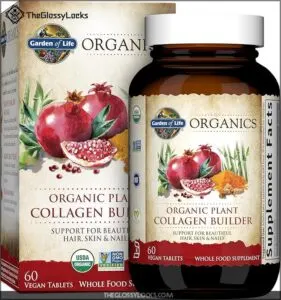
Garden of Life’s Vegan Collagen Builder stands out as a plant-powered alternative to traditional biotin supplements.
Containing 2,500 mcg of whole food biotin derived from organic sesbania, this USDA organic product supports hair, skin, and nail health without animal ingredients.
The formula combines silica from bamboo for natural collagen production with antioxidant-rich pomegranate to protect skin from UV damage.
Users report improved skin texture, faster hair growth, and stronger nails after consistent use, appreciating the clean formula free from sugar and fillers, with third-party testing and multiple certifications (gluten-free, non-GMO, kosher).
Best For: Individuals seeking a vegan, plant-based supplement to support hair, skin, and nail health with additional antioxidant benefits.
- Results may require long-term commitment (6-8 months) for noticeable benefits.
- Large tablet size may be difficult for some users to swallow.
- Improvements may vary based on individual health and nutritional deficiencies.
- Certified USDA Organic, Non-GMO, Gluten-Free, and Kosher.
- Contains 2,500 mcg of whole food biotin and silica for natural collagen production.
- Clean, sugar-free formula with antioxidant-rich ingredients like pomegranate and turmeric.
2. Olly Ultra Strength Hair Softgels
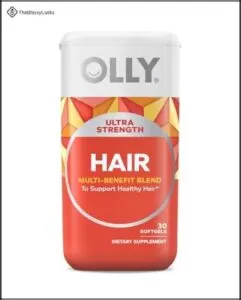
Looking for a powerhouse biotin supplement? OLLY Ultra Strength Hair Softgels deliver a potent blend of biotin, keratin, silicon, and amla in a convenient 30-day supply.
These strawberry-scented, gluten-free softgels support stronger, fuller hair from within. Users typically notice improvements in hair volume and reduced shedding within 2-4 weeks, though significant results may take longer.
While pricier than some alternatives, many customers find the results worth the investment. You’ll need just one softgel daily with water.
NSF-certified for quality and safety, these softgels contain no artificial flavors or sugar.
Best For: Individuals seeking to improve hair strength, fullness, and overall health with a convenient, high-quality softgel.
- Contains Biotin, Keratin, Silicon, and Amla for comprehensive hair support.
- Noticeable improvements in hair volume and shedding within 2-4 weeks for many users.
- Gluten-free, sugar-free, and NSF-certified for quality and safety.
- Higher price point compared to other alternatives.
- Some users reported allergic reactions like itching or rashes.
- Packaging criticized for excessive air space, leading to disappointment.
3. Hair Skin Nails Ultra Supplement
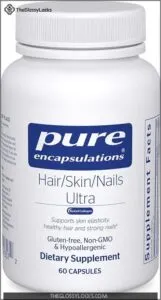
Pure Encapsulations Hair Skin Nails Ultra delivers a powerhouse formula with an impressive 20,000% DV of biotin.
This extensive supplement combines BioCell Collagen complex (500mg) with vitamin C, zinc, and specialized ingredients like CoQ10 and grape seed extract.
You’ll appreciate its hypoallergenic, gluten-free formulation that’s free from artificial additives and common allergens.
The unflavored capsules (two daily with meals) work to enhance skin elasticity, strengthen nails, and support healthy hair growth.
At $48.40 for a 30-day supply, it’s a quality investment in your appearance backed by transparent ingredient sourcing.
Best For: Adults seeking a hypoallergenic, high-potency supplement to support hair, skin, and nail health.
- High biotin content (20,000% DV) for nail strength and hair growth.
- Includes BioCell Collagen and antioxidants for skin elasticity and hydration.
- Hypoallergenic, gluten-free, and free from artificial additives.
- Price may be higher compared to other similar supplements.
- Biotin may interfere with certain blood tests.
- Requires consistent daily use (two capsules) for optimal results.
4. Pure Encapsulations Biotin 8mg Supplement
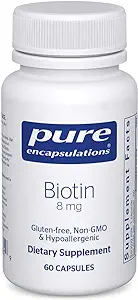
This premium biotin supplement delivers a potent 8,000 mcg (26,667% DV) in each vegetarian capsule.
Pure Encapsulations offers a hypoallergenic formula free from common allergens like gluten, dairy, and nuts, making it ideal for those with sensitivities.
You’ll appreciate the clean ingredient list—just biotin and plant fiber, without artificial additives.
Users report stronger nails with less splitting and improved hair quality.
Beyond cosmetic benefits, this supplement supports healthy metabolism and nerve cell function.
With 120 capsules per bottle, it’s manufactured in the USA under strict quality standards.
Best For: Individuals seeking a high-potency biotin supplement to support hair, skin, nails, metabolism, and overall wellness, especially those with sensitivities to common allergens.
- High-potency formula with 8,000 mcg of biotin per capsule.
- Free from allergens like dairy, gluten, and nuts.
- Supports stronger nails, healthier hair, and improved metabolism.
- May interfere with blood test results if not timed properly.
- Synthetic biotin may not suit users preferring natural ingredients.
- Results may require long-term use for noticeable effects.
5. Biotin Gummies for Hair Skin and Nails
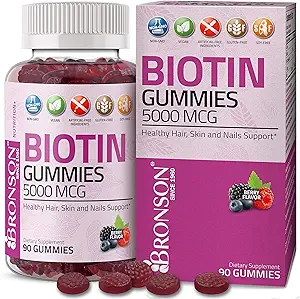
These vegan-friendly gummies pack a powerful 5000 MCG biotin punch in each serving, making them a standout choice for hair, skin, and nail health.
You’ll appreciate their delightful wild berry flavor, often compared to gummy bears, which makes daily supplementation something to look forward to rather than a chore.
Free from GMOs, gluten, and soy, they’re crafted in a cGMP registered New York facility.
Users report noticeable improvements in hair thickness and nail strength within a month. However, those with acne-prone skin should proceed with caution, as initial breakouts are possible.
Best For: Those seeking a high-dose biotin supplement to improve hair thickness, nail strength, and skin health, especially vegans and vegetarians.
- High potency with 5000 MCG biotin per serving for noticeable results.
- Vegan, non-GMO, gluten-free, and soy-free formula.
- Pleasant wild berry flavor that enhances daily adherence.
- Potential for initial breakouts, especially in acne-prone individuals.
- Not suitable for those who dislike sweet gummy textures.
- Results may vary, requiring consistent long-term use for best effects.
6. Hair Skin Nails Growth Supplement
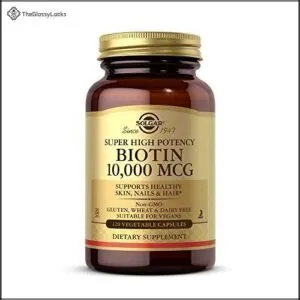
Why settle for just biotin when you can get an inclusive formula? Solgar’s Hair Skin Nails Growth Supplement delivers an impressive 10,000 mcg of biotin in each serving while maintaining high quality standards.
Free from gluten, dairy, soy, and artificial additives, this non-GMO and vegan formula supports not just appearance but overall metabolism too. It’s worth noting that biotin deficiency is rare in individuals with a balanced diet.
Users report stronger nails and reduced hair fall within weeks, with particularly positive results for those with conditions like PCOS. The easy-to-swallow capsules come in a premium glass bottle, preserving freshness throughout your wellness journey.
Best For: Individuals looking to improve hair, skin, and nail health, particularly those with conditions like PCOS or nutrient deficiencies.
- High potency with 10,000 mcg of biotin per serving for noticeable results.
- Non-GMO, vegan, and free of gluten, dairy, and artificial additives.
- Premium glass bottle packaging preserves freshness and quality.
- Limited evidence of benefit for those without biotin deficiency.
- High biotin dose may not suit everyone and could pose risks.
- Relatively higher cost compared to some alternatives.
7. Extra Strength Biotin Liquid Supplement
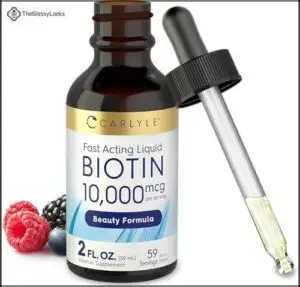
Many people appreciate the convenience of Carlyle’s Extra Strength Biotin Liquid Supplement, which delivers 10,000 mcg per serving in berry-flavored drops.
This vegetarian formula stands out for being free from gluten, artificial sweeteners, GMOs, and common allergens like yeast and lactose.
The liquid format allows for precise dosing and potentially better absorption compared to pills.
Laboratory tested for purity and potency, this supplement supports your hair, skin, and nail health while fitting seamlessly into dietary restrictions.
It’s a practical choice if you struggle with swallowing capsules.
Best For: Individuals seeking a vegetarian, allergen-free, and easy-to-take biotin supplement for hair, skin, and nail health.
- Provides a high dose of 10,000 mcg of biotin per serving for beauty benefits.
- Liquid formula allows for better absorption and precise dosing.
- Free from gluten, GMOs, and common allergens like yeast and lactose.
- May require refrigeration after opening, depending on user preference.
- Liquid format may not be as portable as capsules or tablets.
- Berry flavor may not appeal to everyone.
8. Klaire Labs Biotin 5000 mcg
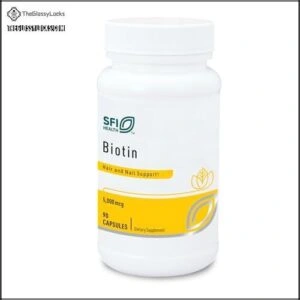
A trusted heavyweight in the biotin market, Klaire Labs Biotin 5000 mcg delivers exceptional potency in an easy-to-swallow capsule.
You’ll appreciate its hypoallergenic formula, free from common allergens like gluten, dairy, and soy.
This physician-developed supplement supports not just hair, skin, and nail health, but also aids in fatty acid synthesis and metabolism of carbohydrates, proteins, and fats.
Users report noticeable improvements in hair thickness and nail strength after just one month.
With no artificial colors or preservatives, it’s a clean choice that’s been earning repeat purchases since 1969.
Best For: Adults seeking a high-potency biotin supplement for hair, skin, and nail health, especially those with dietary restrictions or biotin deficiencies.
- High-potency 5,000 mcg biotin per capsule with noticeable results in hair and nail health.
- Hypoallergenic, vegan, and free from common allergens like gluten, dairy, and soy.
- Small, easy-to-swallow capsules with no artificial colors or preservatives.
- White capsule color could cause confusion with other medications.
- Not evaluated by the FDA for specific medical claims.
- Limited stock availability noted in some sources.
9. Nature Made Biotin for Healthy Hair
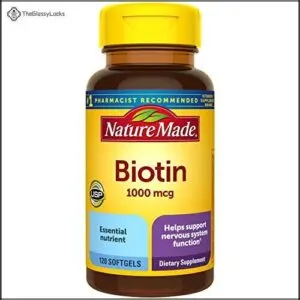
Searching for reliable biotin support? Nature Made’s 1000 mcg biotin softgels deliver 120 days of consistent nourishment for your hair, skin, and nails.
These USP-verified supplements are gluten-free with no synthetic dyes or artificial flavors. You’ll appreciate the small, easy-to-swallow gelcaps that strengthen fingernails while reducing peeling and splitting.
Many users report reduced hair loss and stronger nails after regular use. Simply take one softgel daily with water and a meal to support energy metabolism and healthy aging. Made in the USA with high-quality ingredients.
Best For: Individuals looking to support hair, skin, and nail health while boosting energy metabolism with a reliable, easy-to-take supplement.
- 1000 mcg softgel option is discontinued and may not be available for purchase.
- Not suitable for people looking for higher doses of biotin like 5000 mcg.
- Can interfere with certain lab test results, requiring prior consultation.
- USP-verified gluten-free formula with no synthetic dyes or artificial flavors.
- Small, easy-to-swallow softgels that strengthen nails and reduce peeling.
- Users report reduced hair loss and improved nail health.
Maximizing Biotin Effects
You’ll maximize biotin’s effectiveness by pairing your supplement with a nutrient-rich diet and complementary vitamins like C, E, and zinc.
Consistent intake timing, adequate hydration, and regular exercise can further enhance absorption and deliver ideal results for your hair, skin, and nail health, which is crucial for overall wellness.
Combining Biotin With Other Vitamins
Now that you’ve chosen your ideal biotin supplement, maximize its effectiveness by pairing it with complementary vitamins.
Biotin doesn’t work alone—it performs better with friends.
For synergistic vitamins and enhanced absorption, consider these powerful combinations:
- Vitamin C + Biotin: Boosts collagen production for stronger hair and skin
- Vitamin D + Biotin: Especially beneficial during winter months for hair follicle health
- Vitamin E + Biotin: Protects against oxidative stress for better skin
- Vitamin B12 + Biotin: Works together in energy production cycles
Remember, nutrient interactions vary based on individual needs. Biotin also boosts metabolism, aiding in weight management and glucose control. Adults typically need 30 micrograms daily for ideal health. Take water-soluble biotin vitamins with water and food for best results.
Importance of a Balanced Diet
While taking a biotin supplement can boost your hair and nail health, it’s what you eat daily that truly matters.
Your body absorbs biotin more effectively when paired with a varied, nutrient-rich diet.
Include biotin-rich foods like eggs, nuts, and sweet potatoes to enhance gut health and support overall wellness.
This food-first approach guarantees maximum nutrient absorption and sustained energy levels throughout your day.
Regular Exercise and Healthy Lifestyle
While eating biotin-rich foods supports nutrient absorption, regular exercise enhances the effectiveness of any biotin supplement you’re taking.
Physical activity improves circulation, delivering nutrients more efficiently to hair follicles and skin cells.
Exercise also reduces stress, which can contribute to hair loss.
Combine consistent workouts with quality sleep for ideal biotin benefits, creating perfect conditions for maximizing hair growth and skin health results from your supplements.
Biotin Safety Precautions
You’ll need to stop taking biotin supplements at least 48 hours before bloodwork, as they can interfere with lab test results including thyroid and heart function tests.
While biotin is generally safe even at higher doses, it’s important to consult your healthcare provider before starting supplementation, especially if you’re pregnant, breastfeeding, or taking medications.
Potential Interactions With Medications
While optimizing your biotin routine is important, you should know about potential drug interactions that could impact your health.
Biotin supplements can interfere with certain medications like warfarin and metoprolol, affecting drug efficacy through enzyme competition.
Anticonvulsant medications may lower biotin levels, potentially requiring supplementation.
If you’re taking levothyroxine, maintain at least a four-hour gap between doses. Always inform your doctor about biotin use, as it can also skew laboratory test results.
Risks of Biotin Deficiency
While biotin deficiency remains rare, overlooking its risks could lead to troubling consequences.
You’ll notice symptoms like hair loss, skin changes, and even conjunctivitis if deficiency develops.
Genetic factors such as biotinidase deficiency can prevent proper utilization, while pregnancy risks increase as biotin levels naturally decrease.
Alcohol impact is significant too, as consumption interferes with biotin processing.
In severe cases, deficiency may cause seizures requiring immediate attention.
Some individuals may experience biotin side effects, such as headaches, with high doses.
Importance of Consulting a Healthcare Professional
While biotin deficiency can cause serious health issues, you shouldn’t self-diagnose or self-medicate.
A healthcare professional can help determine your personalized needs based on underlying conditions and medications you’re taking.
Your doctor can provide dosage guidance that’s right for you and warn about potential medication interactions.
Remember that biotin can cause testing interference with critical lab work—another reason why doctor consultation before starting supplements isn’t just helpful, it’s smart.
Frequently Asked Questions (FAQs)
What are the benefits of taking biotin supplements?
Like a catalyst for your body’s engine, biotin supplements boost energy metabolism, strengthen hair and nails, improve skin health, and support cell regeneration.
You’ll often notice improved nail strength and hair growth.
How to use biotin supplements for clear skin?
Take 5-3mg daily, but research is limited on skin benefits.
You’ll need to consult your doctor before starting, especially if you take antibiotics.
Consider combining with collagen supplements for potentially better results.
How much biotin should I take daily?
For healthy hair and skin, you should take 30 mcg of biotin daily as an adult.
This increases to 35 mcg if you’re breastfeeding.
Higher doses (2,000-10,000 mcg) are common in supplements, though generally unnecessary.
Are biotin supplements safe to take?
Yes, biotin supplements are generally safe for most people.
You’re unlikely to experience side effects even at higher doses, though you should stop taking them 48 hours before bloodwork to avoid interfering with lab tests.
Which brand is best for biotin?
Pure Encapsulations, Life Extension, and Garden of Life consistently rank highest for biotin.
You’ll get the most bang for your buck with third-party tested options like these that offer quality ingredients with minimal additives.
Do biotin supplements really work?
While everyone’s hunting for miracle hair growth, you’ll find biotin mainly works if you’re actually deficient.
Scientific evidence shows it’s beneficial for specific conditions, not generally effective for healthy individuals seeking lustrous locks.
What strength of biotin should I take?
Most adults should take 30-100 mcg of biotin daily, though supplements often contain 2,000-10,000 mcg which is generally safe. Stop taking biotin 48 hours before bloodwork to avoid test interference.
What is the best brand of biotin to take?
Like finding a diamond in a vitamin mine, you’ll want Life Extension, Pure Encapsulations, or Garden of Life.
These third-party tested brands offer quality biotin with minimal additives.
OLLY’s gummies work well for convenience.
Which type of biotin is best?
The most effective biotin supplements are third-party tested with minimal additives.
Look for biotin doses between 30-10,000 mcg based on your needs.
Forms include capsules, gummies, or liquids—choose what you’ll actually take consistently.
Is it better to take 5000 or 10,000 biotin?
For most people, 5,000 mcg biotin is sufficient to support hair and nail health. The 10,000 mcg dose isn’t necessarily better and both exceed daily requirements, but neither typically causes side effects.
Conclusion
Research confirms that the best biotin supplement for you depends on your specific health goals and lifestyle.
Whether you’re battling thinning hair or brittle nails, consistency with your chosen supplement is essential.
Remember to pair your biotin with complementary nutrients and a balanced diet for maximum results.
With the right biotin supplement from our top-rated list, you’ll be well on your way to stronger hair, healthier skin, and more resilient nails within months.




